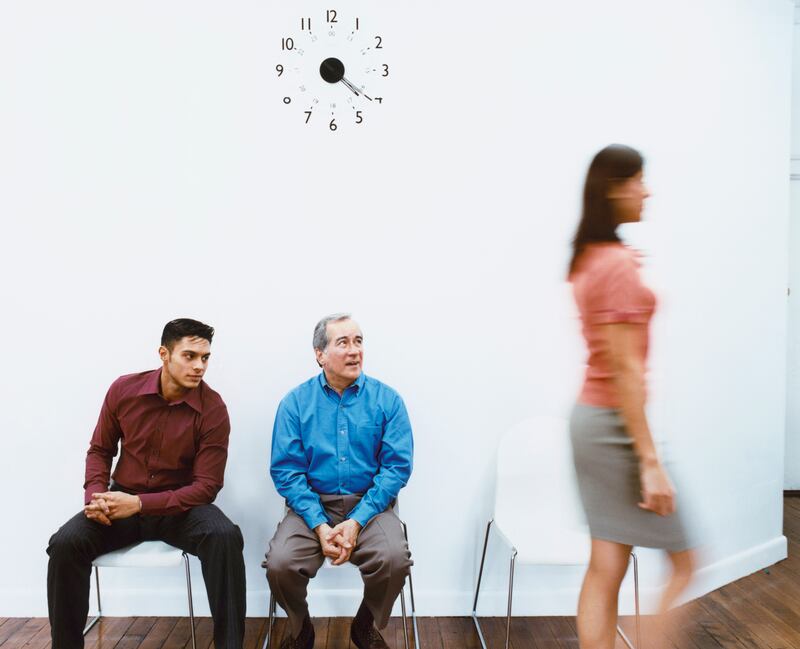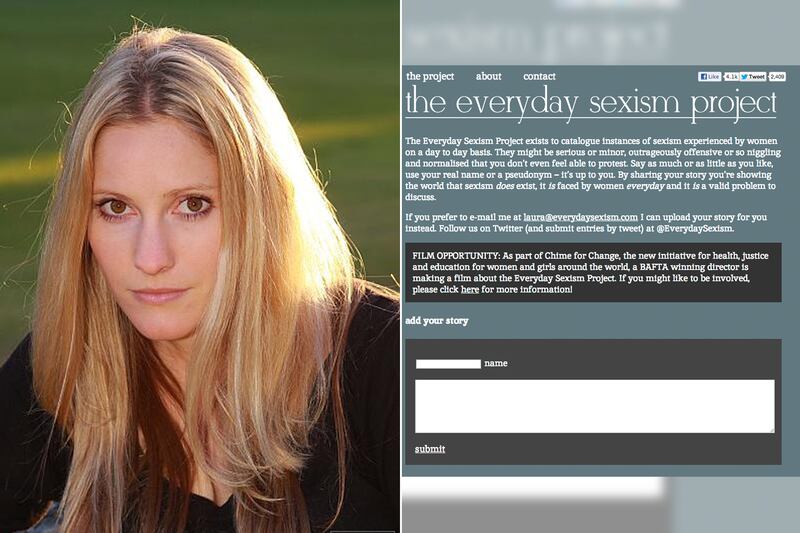A young girl is stopped on the street by a man driving a van, who asks the girl, “Do you have a tight pussy?” The girl, just 11, has no idea what he’s referring to. Another girl changes her route home from school after being repeatedly harassed by her male classmates. And one schoolgirl walks home from class with a friend and is stopped by a stranger who demands the girls show him their breasts. “We’re only 13!” she yells at him. His reply? “Even better.”

These stories are found on the popular U.K. blog Everyday Sexism, a free-for-all platform where women and girls can detail instances of sexism in their lives in a public but anonymous space. Laura Bates, the 26-year-old London-based founder, created the site nearly a year ago, after attempting to speak up about the sexism she faced and getting a maddening response.
“Again and again, people told me sexism is no longer a problem—that women are equal now, more or less, and if you can’t take a joke or take a compliment, then you need to stop being so ‘frigid’ and get a sense of humor,” she said. “Even if I couldn’t solve the problem right away, I was determined that nobody should be able to tell us we couldn’t talk about it anymore.”
Bates, like many women, is a frequent target of sexual objectification—from being catcalled “almost daily” out on walks to having her bottom grabbed on the street. But like many other women, Bates found that when she tried to talk about the harassment, she was told to quit making a fuss, that these situations were “not a big deal” and were just “normal.” But is having your body parts grabbed and being a target of drive-by jeers and unwarranted sexual demands really considered normal? According to Bates, it absolutely is.

Just consider how often women are groped in nightclubs, she said. “The problem has become so normalized, victims are not even aware it is sexual assault and wouldn’t use that term,” she said. But technically, she points out, women are protected from unwanted touching under U.K. law, a fact many are unaware of.
“The definition of sexual assault encompasses this [nightclub] experience,” Bates said. “But if a girl had her bottom groped or breast stroked in a nightclub and then told her friends she’d been sexually assaulted, they’d tell her to stop overreacting and being melodramatic.”
After she wrote an article on the definition of sexual assault, Bates received hundreds of tweets and emails from women who hadn’t realized they had been sexually assaulted. Many told her they hadn’t known they had a right to say no to inappropriate touching.
Although Everyday Sexism focuses on average women, they aren’t the only ones who face prejudice on a daily basis. Female celebrities are constantly scrutinized, dehumanized, and reduced to individual body parts. Take, for example, Kim Kardashian, a celebrity whose pregnancy has inspired countless media headlines. Bates describes the media outlets “falling over one another to describe her baby weight in gleeful detail.” A headline on one Now magazine blog post asked: “Is it just me, or is Kim Kardashian giving birth out of her bum?”
And at this year’s Academy Awards ceremony, Anne Hathaway’s Best Supporting Actress win was overshadowed by what may or may not have been a wardrobe malfunction. “Every headline was about whether or not you could see her nipples,” Bates said. “All this completely takes precedence over her actual achievements.”
But do male actors face the same stigma? Heartthrobs like Ryan Gosling, Bradley Cooper, and Jon Hamm get plenty of attention for their looks. From the “Hey Girl” Gosling memes to the recent flurry of attention on Hamm’s manhood, there’s no denying that men in the public eye also can be reduced to their good looks and reproductive organs.
Bates agrees, but said she finds that the sexualization of actresses overshadows any other noteworthy traits. “There are plenty of outstanding male actors who are very successful without being conventionally ‘handsome,’” she said. “With women, there are very, very few successful actresses who are not highly sexualized.” She added: “They have to conform to a media-defined ideal of appearance—the very thin, white, big-breasted, young, long-legged starlet.”
But women in the public eye who are not actresses—women in positions of political power, businesswomen, and even criminals or victims of crime—also are eroticized. Many men (and women) evaluated Sarah Palin, the could-have-been GOP vice president from Alaska, based on her appearance. Columnist Gene Lyons wrote of the politician: “The high-sheen lip gloss, the ‘Naughty Monkey’ brand red pumps, the black leather outfits, the winking, for heaven’s sake. She’s the original ‘Mean Girl’—the head honcho of Orwell’s ‘Junior Anti-Sex League’ dressed to kill.” He concluded: “You want her, but you can’t have her.”
As Hillary Clinton campaigned for the Democratic nomination in 2008, a group of men could be heard in the audience shouting, “Iron my shirt!” Rush Limbaugh asked his listeners of Clinton’s possible presidency, “Will Americans want to watch a woman get older before their eyes on a daily basis?”
“A man can be a father, a doctor, a politician, a lawyer, without his sex being an issue or being commented on,” said Bates. Meanwhile, “Hillary Clinton faces questions about her favorite designers instead of her policies, and Sarah Palin was immortalized as a blow-up doll.”
Today Bates is prepping the launch of 15 international versions of the site. The reaction to Everyday Sexism and the feedback has been “overwhelmingly positive” from both genders, she said, but “from a small minority [of men], the response has been very nasty.” So nasty, indeed, that Bates was forced to temporarily relocate from her London flat after receiving death threats.
But the blog, which will have nearly 25,000 entries by its one-year anniversary on April 16, aims to help remedy these hateful comments. By giving women a safe space where they can feel validated and find solidarity in a community of their peers, the site has already made a significant contribution to the cause. “Hundreds of women have written with success stories, saying reading the site gave them the confidence to stand up to sexism in the workplace, share an experience with a friend or family member that they hadn’t felt able to talk about before, or even in many cases, report an instance of sexual assault,” she said, and added, “Every single woman has a story.”




